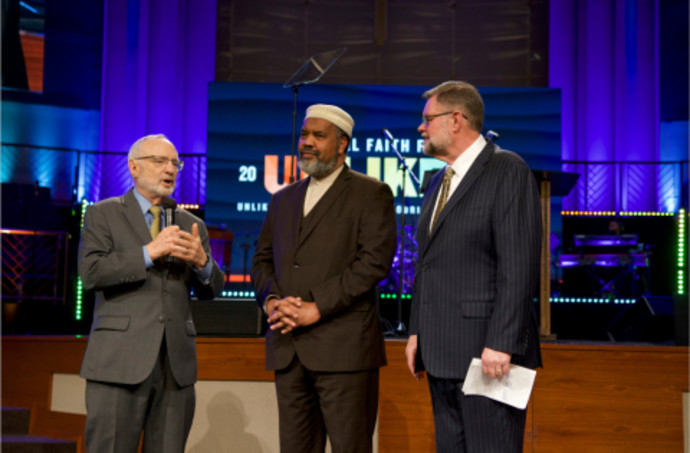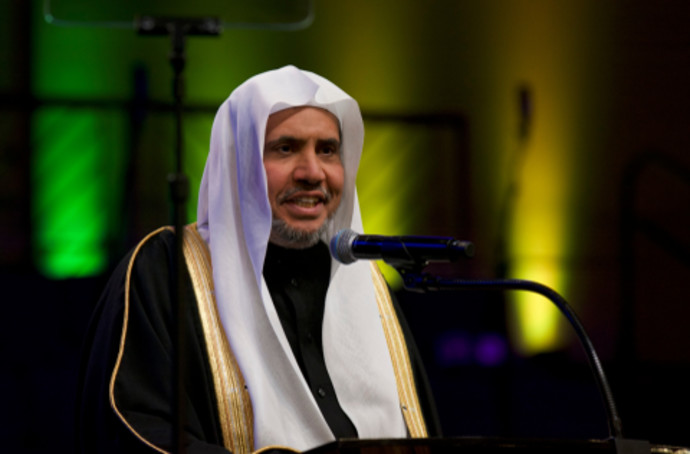Recognizing the great momentum created by the Global Faith Forum discussions in Dallas and Kansas City earlier this month, the Multi-Faith Neighbors Network (MFNN) held their third and final gathering in Washington, D.C. last week, which culminated in meals being packed for the needy in the local community.
For more stories from ALL ARAB NEWS go to allarab.news
The forum’s theme, “Unlikely,” referring to the unexpected alliance between the three major world faiths – Christian, Muslim and Jewish – is based on the premise that transformation begins with intentional relationships and developing deep bonds of mutual trust and respect with leaders of other faiths.
Representative leaders from the Evangelical, Muslim and Jewish faiths affirmed their commitment to addressing polarization and politicization within their own communities. They also resolved to collectively break down barriers of fear between different faiths and further cultivate multi-faith relationships to build bridges of understanding and collaboration while maintaining their respective and distinct theologies and identities.
“Two things you need to know about the program this evening,” said Pastor Bob Roberts, co-founder of MFNN and co-host of the gathering at the First Baptist Church (FBC) Glenarden. “First, this is ‘multifaith,’ not interfaith. As Evangelicals, we are committed to what we believe without compromise, as are our fellow Muslim and Jewish leaders to the distinctives and identities of their respective religions.
“Secondly, we’re relational,” he continued. “For years people have argued in interfaith dialogue about who is right, but that is not our concern; rather, how we get along."
Imam Mohamed Magid, executive Imam of All Dulles Area Muslim Society (ADAMS) Center in Sterling, Virginia and co-host of the events, said the following: “We believe it is vital to continue this important dialogue in communities worldwide. These conversations are critical in building bridges that will stop hate, make peace and facilitate lasting relationships.
“We are not compromising our faith, but rather trying to work toward the common good, care about each other and collaborate with one another,” he added.

Prior to each event, Evangelical and Muslim volunteers from local churches and mosques worked together to pack thousands of meals for needy and under-served families in their area as an example of what can be done when dialogue turns into cooperative action for the benefit of the common good of the community.
“When we gather together like this, it gives me hope; there is a lot more we can do together than we can do alone,” Magid said. “It was God’s will that we look differently and have different colors. This validates the concept of human diversity. Our goal is to work with religious leaders to transform their congregations.”
MFNN co-founder Rabbi David Saperstein shared his thoughts about the collaborative approach and why it matters.
“In the act of doing what we do, we model a world that we are trying to create…we don’t have a choice; we have to work together,” he said.
Dr. Mohammad Al-Issa, general secretary of the Muslim World League (MWL), based in Saudi Arabia, referenced the Charter of Makkah, a groundbreaking declaration created by the organization in 2019. The document supports anti-extremism, human rights for all people and women’s rights; ensures religious and cultural diversity; encourages peaceful co-existence; and supports legislation against hate, violence and discrimination between religions.

“The global community is as divided as it has ever been, and we want to usher in a new chapter,” Al-Issa stated. “As the world becomes inter-connected, there has been an increase in terrorism, driven by social media. Our only hope is to work together to build bridges of respect and harmony among people of all faiths.
“Real progress only happens when actions and courage are combined with unwavering resolve to cultivate lasting friendships and understanding regardless of race, ethnicity, faith, gender or creed,” he said via an English translator. “The Charter of Makkah sets a new course for the future of humanity and ensures lasting peace and prosperity for all.”
As with the first two events, the final session incorporated songs and recitations from each faith, including a 17-year-old girl who recited from the Qur’an, which she has committed to memory in its entirety.
At the close of each Global Faith Forum, Roberts, Magid, Saperstein and Al-Issa signed a formal statement of intent, committing to building bridges that will stop hate, make peace and facilitate relationships.
This article originally appeared here.
